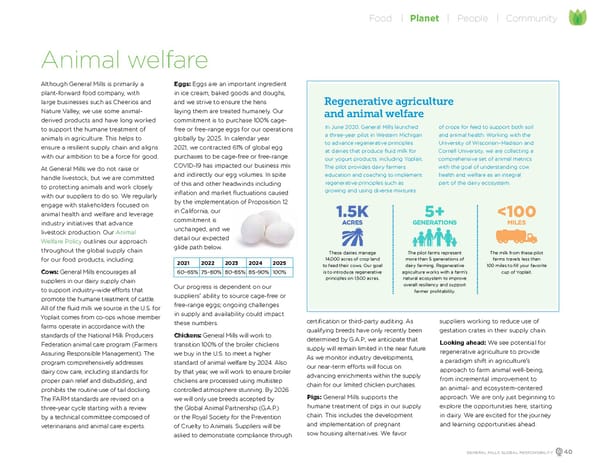Although General Mills is primarily a plant-forward food company, with large businesses such as Cheerios and Nature Valley, we use some animal- derived products and have long worked to support the humane treatment of animals in agriculture. This helps to ensure a resilient supply chain and aligns with our ambition to be a force for good. At General Mills we do not raise or handle livestock, but we are committed to protecting animals and work closely with our suppliers to do so. We regularly engage with stakeholders focused on animal health and welfare and leverage industry initiatives that advance livestock production. Our Animal Welfare Policy outlines our approach throughout the global supply chain for our food products, including: Cows: General Mills encourages all suppliers in our dairy supply chain to support industry-wide efforts that promote the humane treatment of cattle. All of the fluid milk we source in the U.S. for Yoplait comes from co-ops whose member farms operate in accordance with the standards of the National Milk Producers Federation animal care program (Farmers Assuring Responsible Management). The program comprehensively addresses dairy cow care, including standards for proper pain relief and disbudding, and prohibits the routine use of tail docking. The FARM standards are revised on a three-year cycle starting with a review by a technical committee composed of veterinarians and animal care experts. Eggs: Eggs are an important ingredient in ice cream, baked goods and doughs, and we strive to ensure the hens laying them are treated humanely. Our commitment is to purchase 100% cage- free or free-range eggs for our operations globally by 2025. In calendar year 2021, we contracted 61% of global egg purchases to be cage-free or free-range. COVID-19 has impacted our business mix and indirectly our egg volumes. In spite of this and other headwinds including inflation and market fluctuations caused by the implementation of Proposition 12 in California, our commitment is unchanged, and we detail our expected glide path below. Our progress is dependent on our suppliers’ ability to source cage-free or free-range eggs; ongoing challenges in supply and availability could impact these numbers. Chickens: General Mills will work to transition 100% of the broiler chickens we buy in the U.S. to meet a higher standard of animal welfare by 2024. Also by that year, we will work to ensure broiler chickens are processed using multistep controlled atmosphere stunning. By 2026 we will only use breeds accepted by the Global Animal Partnership (G.A.P.) or the Royal Society for the Prevention of Cruelty to Animals. Suppliers will be asked to demonstrate compliance through certification or third-party auditing. As qualifying breeds have only recently been determined by G.A.P., we anticipate that supply will remain limited in the near future. As we monitor industry developments, our near-term efforts will focus on advancing enrichments within the supply chain for our limited chicken purchases. Pigs: General Mills supports the humane treatment of pigs in our supply chain. This includes the development and implementation of pregnant sow housing alternatives. We favor suppliers working to reduce use of gestation crates in their supply chain. Looking ahead: We see potential for regenerative agriculture to provide a paradigm shift in agriculture’s approach to farm animal well-being, from incremental improvement to an animal- and ecosystem-centered approach. We are only just beginning to explore the opportunities here, starting in dairy. We are excited for the journey and learning opportunities ahead. Animal welfare 2021 2022 2023 2024 2025 60–65% 75–80% 80–85% 85–90% 100% Regenerative agriculture and animal welfare 1.5K 5+ <100 In June 2020, General Mills launched a three-year pilot in Western Michigan to advance regenerative principles at dairies that produce fluid milk for our yogurt products, including Yoplait. The pilot provides dairy farmers education and coaching to implement regenerative principles such as growing and using diverse mixtures of crops for feed to support both soil and animal health. Working with the University of Wisconsin–Madison and Cornell University, we are collecting a comprehensive set of animal metrics with the goal of understanding cow health and welfare as an integral part of the dairy ecosystem. These dairies manage 14,000 acres of crop land to feed their cows. Our goal is to introduce regenerative principles on 1,500 acres. The pilot farms represent more than 5 generations of dairy farming. Regenerative agriculture works with a farm’s natural ecosystem to improve overall resiliency and support farmer profitability. The milk from these pilot farms travels less than 100 miles to fill your favorite cup of Yoplait. ACRES GENERATIONS MILES GENERAL MILLS GLOBAL RESPONSIBILITY 40 Food Planet People Community
 GeneralMills Global Responsibility Report Page 41 Page 43
GeneralMills Global Responsibility Report Page 41 Page 43